最新人教版五年级下册英语知识点整理
- 格式:doc
- 大小:39.00 KB
- 文档页数:7
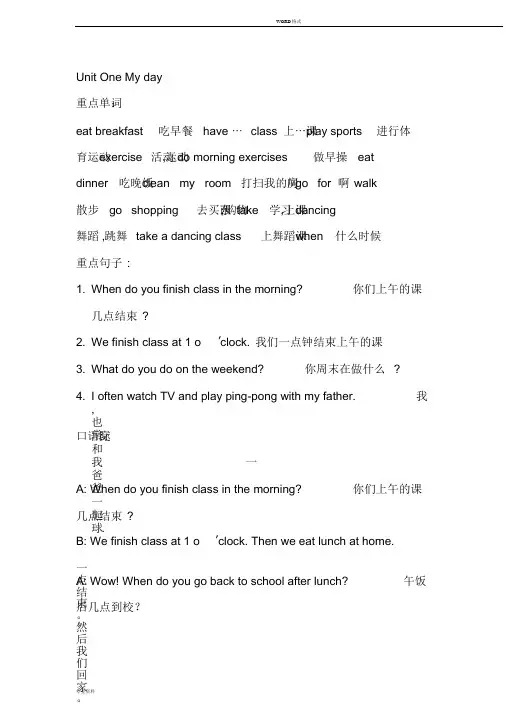
Unit One My day 重点单词: eat breakfast吃早餐 have ⋯ class 上⋯课p lay sports 进行体育运动e xercise 活动,运动d o morning exercises做早操 eatdinner 吃晚饭c lean my room 打扫我的房间go for 啊 walk 散步 go shopping去买东西,购物t ake 学习,上课d ancing舞蹈 ,跳舞 take a dancing class 上舞蹈课w hen 什么时候重点句子 :1. When do you finish class in the morning? 你们上午的课几点结束 ?2. We finish class at 1 o’clock. 我们一点钟结束上午的课.3. What do you do on the weekend?你周末在做什么 ?4. I often watch TV and play ping-pong with my father. 我 ,也常和我爸爸一起球.口语交际: 一 A: When do you finish class in the morning? 你们上午的课 几点结束 ? B: We finish class at 1 o ’clock. Then we eat lunch at home. 一点结束。
然后我们回A: Wow! When do you go back to school after lunch? 午饭后几点到校?B: At 2:30. Classes start at 3 o ’clock. 两点半到校,三点上课。
A: When do you usually eat dinner in Spain? 在西班牙你们通常几点吃晚饭?B: Usually at 9:30 or 10 o ’clock. 通常在九点半或十点。
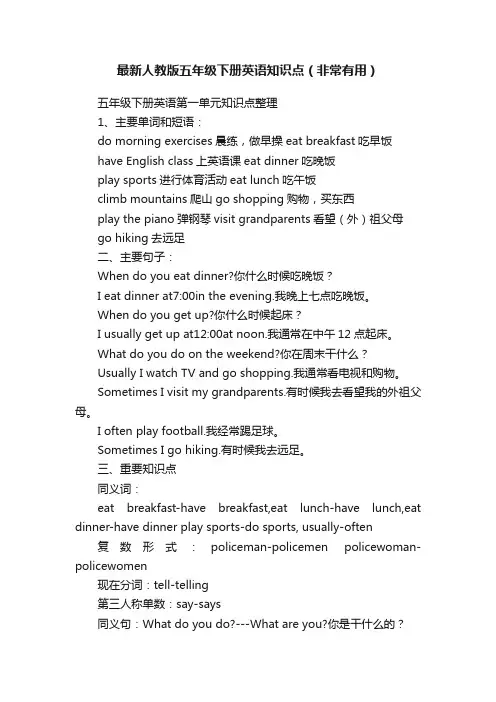
最新人教版五年级下册英语知识点(非常有用)五年级下册英语第一单元知识点整理1、主要单词和短语:do morning exercises晨练,做早操eat breakfast吃早饭have English class上英语课eat dinner吃晚饭play sports进行体育活动eat lunch吃午饭climb mountains爬山go shopping购物,买东西play the piano弹钢琴visit grandparents看望(外)祖父母go hiking去远足二、主要句子:When do you eat dinner?你什么时候吃晚饭?I eat dinner at7:00in the evening.我晚上七点吃晚饭。
When do you get up?你什么时候起床?I usually get up at12:00at noon.我通常在中午12点起床。
What do you do on the weekend?你在周末干什么?Usually I watch TV and go shopping.我通常看电视和购物。
Sometimes I visit my grandparents.有时候我去看望我的外祖父母。
I often play football.我经常踢足球。
Sometimes I go hiking.有时候我去远足。
三、重要知识点同义词:eat breakfast-have breakfast,eat lunch-have lunch,eat dinner-have dinner play sports-do sports, usually-often 复数形式:policeman-policemen policewoman-policewomen现在分词:tell-telling第三人称单数:say-says同义句:What do you do?---What are you?你是干什么的?表示频度的副词:always总是,一直;usually通常,常常;often经常;sometimes有时候以复数形式出现的词组:visit grandparents,plant trees介词后跟表示时间的词语时,表示在某年、某月、某个季节,某个时候(在上午,在下午,在晚上)用in;表示在某一天,在星期几用on,在具体的几点几分用at.too和either的用法区别:too和either都是“也”的意思,但too用于肯定句,either用于否定句。
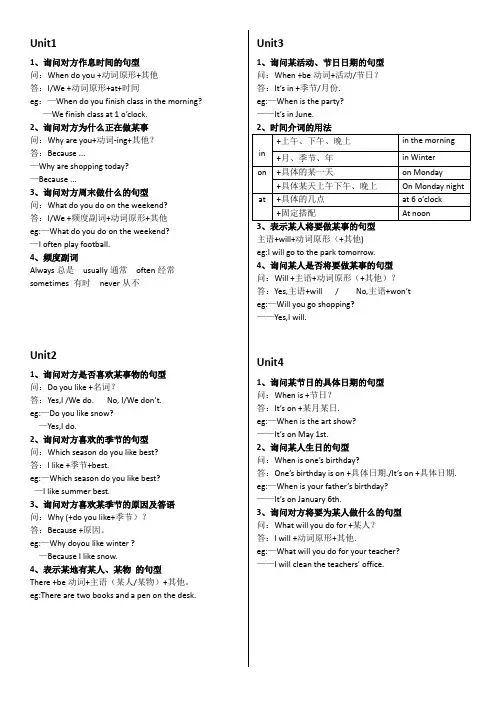
Unit11、询问对方作息时间的句型问:When do you +动词原形+其他答:I/We +动词原形+at+时间eg:—When do you finish class in the morning?—We finish class at 1 o’clock.2、询问对方为什么正在做某事问:Why are you+动词-ing+其他?答:Because ...—Why are shopping today?—Because ...3、询问对方周末做什么的句型问:What do you do on the weekend?答:I/We +频度副词+动词原形+其他eg:—What do you do on the weekend?—I often play football.4、频度副词Always总是usually通常often经常sometimes 有时never从不Unit21、询问对方是否喜欢某事物的句型问:Do you like +名词?答:Yes,I /We do. No, I/We don’t. eg:—Do you like snow?—Yes,I do.2、询问对方喜欢的季节的句型问:Which season do you like best?答:I like +季节+best.eg:—Which season do you like best?—I like summer best.3、询问对方喜欢某季节的原因及答语问:Why (+do you like+季节)?答:Because +原因。
eg:—Why doyou like winter ?—Because I like snow.4、表示某地有某人、某物的句型There +be动词+主语(某人/某物)+其他。
eg:There are two books and a pen on the desk.Unit31、询问某活动、节日日期的句型问:When +be动词+活动/节日?答:It’s in +季节/月份.eg:—When is the party?——It’s in June.主语+will+动词原形(+其他)eg:I will go to the park tomorrow.4、询问某人是否将要做某事的句型问:Will +主语+动词原形(+其他)?答:Yes,主语+will / No,主语+won’t eg:—Will you go shopping?——Yes,I will.Unit41、询问某节日的具体日期的句型问:When is +节日?答:It’s on +某月某日.eg:—When is the art show?——It’s on May 1st.2、询问某人生日的句型问:When is one’s birthday?答:One’s birthday is on +具体日期./It’s on +具体日期. eg:—When is your father’s birthday?——It’s on January 6th.3、询问对方将要为某人做什么的句型问:What will you do for +某人?答:I will +动词原形+其他.eg:—What will you do for your teacher?——I will clean the teachers’ office.1、描述物品归属的句型物品+ be动词(is/are)+(mine/his/hers/yours/ours/theirs) eg:The book is yours.2、确认物品归属地句型问:be动词+this/that/these/those(+其他)+某人的?答:Yes,it is. Yes,they are./ No,it,is’t. No,they aren’t. eg:—Is that crayou his?——Yes,it is.3、询问物品归属的句型问:单数Whose+is it/this/that?复数Whose+are they/these/those?答:It’s/They’re+名词性物主代词/ 名词所有格eg:—Whose bag is this?——It’s mine.4、现在进行时的一般疑问句问:Be动词+主语+动词-ing(+其他)?答:Yes,主语+be动词/ No,主语+be动词+not. eg:—Is she listening to music?——Yes,she is.5、描述某人正在做某事主语+be动词(am/is/are)+动词-ing(+其他).eg:I’m doing my homework now.6、询问某人能否做某事问:Can+主语+动词原形+其他?答:Yes,主语+can. /No,主语+can’t.eg:—Can I play football?——Yes,you can.Unit61、询问多个人或动物正在做什么的句型问:What are +主语(复数)+doing?答:主语(复数)+are+动词-ing+其他.eg:—What are the boys doing?——They are jumping2、询问单个人或动物正在做什么的句型问:What is +主语(单数)+doing?答:主语(单数)+is+动词-ing+其他.eg:—What is Tom doing?——He is playing football.。
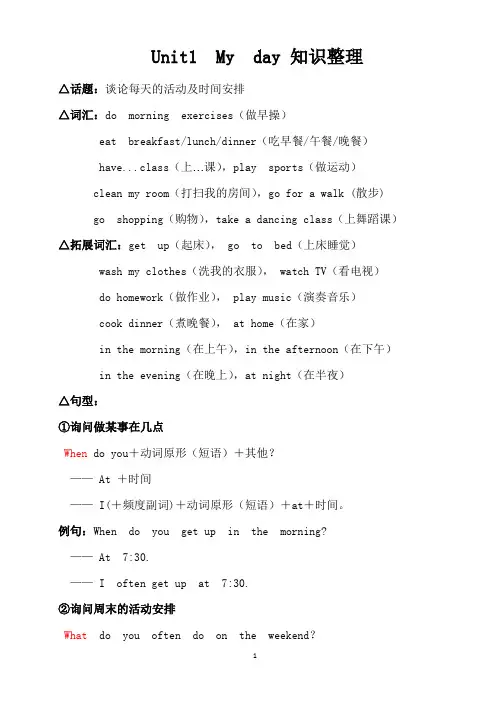
Unit1 My day 知识整理△话题:谈论每天的活动及时间安排△词汇:do morning exercises(做早操)eat breakfast/lunch/dinner(吃早餐/午餐/晚餐)have...class(上…课),play sports(做运动)clean my room(打扫我的房间),go for a walk (散步) go shopping(购物),take a dancing class(上舞蹈课)△拓展词汇:get up(起床), go to bed(上床睡觉)wash my clothes(洗我的衣服), watch TV(看电视)do homework(做作业), play music(演奏音乐)cook dinner(煮晚餐), at home(在家)in the morning(在上午),in the afternoon(在下午)in the evening(在晚上),at night(在半夜)△句型:①询问做某事在几点When do you+动词原形(短语)+其他?—— At +时间—— I(+频度副词)+动词原形(短语)+at+时间。
例句:When do you get up in the morning?—— At 7:30.—— I often get up at 7:30.②询问周末的活动安排What do you often do on the weekend?I often (always/sometime/usually) +…(周末的活动)+with … (某人)+on the weekend (on Saturdays/on Sundays ).例句:What do you do on the weekend ?I often take a dancing class with my friend on Sundays. △知识点:1:注意介词的搭配at +具体时间(几点)/night/home at 9 o ’clock in +国家/季节 in Spainon +星期 on the weekend/on Sundays with +人 with my father/mother/friend 2:表示时间频率词的区别always 表示总是,一直;usually 表示经常,通常;often 表示经常,常常;sometimes 表示有时,间或。
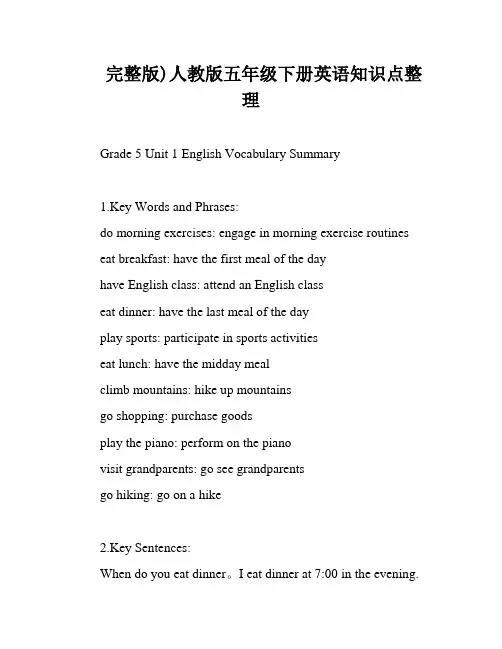
完整版)人教版五年级下册英语知识点整理Grade 5 Unit 1 English Vocabulary Summary1.Key Words and Phrases:do morning exercises: engage in morning exercise routines eat breakfast: have the first meal of the dayhave English class: attend an English classeat dinner: have the last meal of the dayplay sports: participate in sports activitieseat lunch: have the midday mealclimb mountains: hike up mountainsgo shopping: purchase goodsplay the piano: perform on the pianovisit grandparents: go see grandparentsgo hiking: go on a hike2.Key Sentences:When do you eat dinner。
I eat dinner at 7:00 in the evening.When do you get up。
I usually get up at 12:00 at noon.What do you do on the weekend。
Usually。
I watch TV and go shopping。
Sometimes。
I go hiking.I often play football.3.Important Points:Synonyms: eat breakfast - have breakfast。
eat lunch - have lunch。
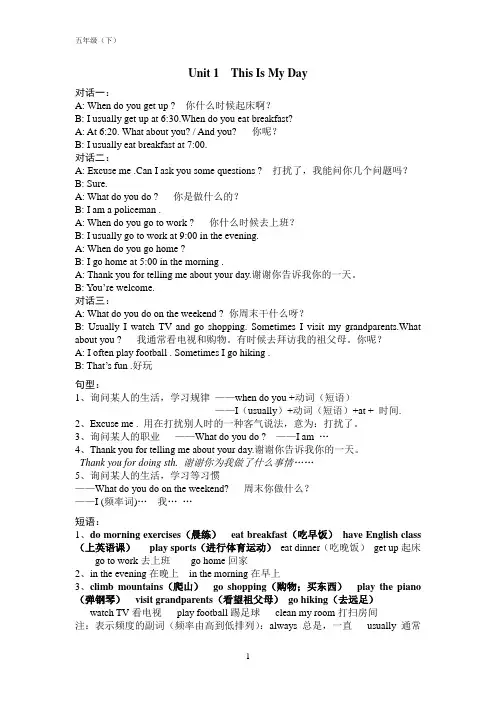
Unit 1 This Is My Day对话一:A: When do you get up ? 你什么时候起床啊?B: I usually get up at 6:30.When do you eat breakfast?A: At 6:20. What about you? / And you? 你呢?B: I usually eat breakfast at 7:00.对话二:A: Excuse me .Can I ask you some questions ? 打扰了,我能问你几个问题吗?B: Sure.A: What do you do ? 你是做什么的?B: I am a policeman .A: When do you go to work ? 你什么时候去上班?B: I usually go to work at 9:00 in the evening.A: When do you go home ?B: I go home at 5:00 in the morning .A: Thank you for telling me about your day.谢谢你告诉我你的一天。
B: You’re welcome.对话三:A: What do you do on the weekend ? 你周末干什么呀?B: Usually I watch TV and go shopping. Sometimes I visit my grandparents.What about you ? 我通常看电视和购物。
有时候去拜访我的祖父母。
你呢?A: I often play football . Sometimes I go hiking .B: That’s fun .好玩句型:1、询问某人的生活,学习规律——when do you +动词(短语)——I(usually)+动词(短语)+at + 时间.2、Excuse me . 用在打扰别人时的一种客气说法,意为:打扰了。
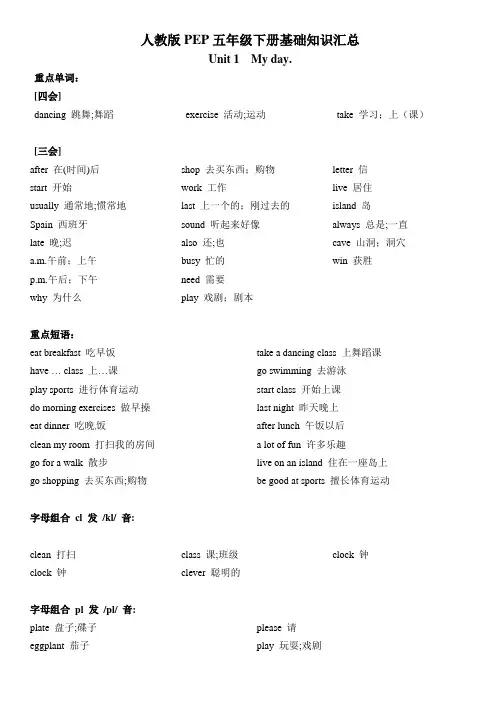
人教版PEP五年级下册基础知识汇总Unit 1 My day.重点单词:[四会]dancing 跳舞;舞蹈exercise 活动;运动take 学习;上(课)[三会]after 在(时间)后start 开始usually 通常地;惯常地Spain 西班牙late 晚;迟a.m.午前;上午p.m.午后;下午why 为什么shop 去买东西;购物work 工作last 上一个的;刚过去的sound 听起来好像also 还;也busy 忙的need 需要play 戏剧;剧本letter 信live 居住island 岛always 总是;一直cave 山洞;洞穴win 获胜重点短语:eat breakfast 吃早饭have … class 上…课play sports 进行体育运动do morning exercises 做早操eat dinner 吃晚饭clean my room 打扫我的房间go for a walk 散步go shopping 去买东西;购物take a dancing class 上舞蹈课go swimming 去游泳start class 开始上课last night 昨天晚上after lunch 午饭以后a lot of fun 许多乐趣live on an island 住在一座岛上be good at sports 擅长体育运动字母组合cl 发/kl/ 音:clean 打扫clock 钟class 课;班级clever 聪明的clock 钟字母组合pl 发/pl/ 音:plate 盘子;碟子eggplant 茄子please 请play 玩耍;戏剧重点句型:1.询问别人什么时候做某事的问句及回答:-- When do/does + 主语+ 动词(短语)原形(+ 其他)?-- 主语(+ 频度副词)+ 动词(短语)原形/ 第三人稀单数形式+ at + 具体时间/ At + 具体时间.-- When do you get up? 你什么时候起床?-- I get up at 5 o'clock. 我5点起床。
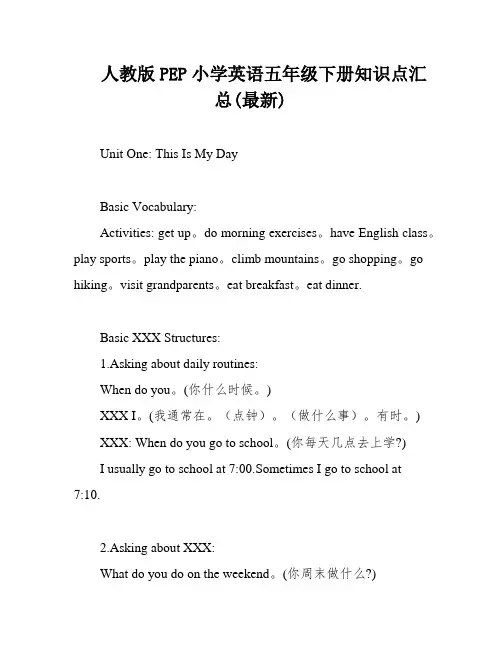
人教版PEP小学英语五年级下册知识点汇总(最新)Unit One: This Is My DayBasic Vocabulary:Activities: get up。
do morning exercises。
have English class。
play sports。
play the piano。
climb mountains。
go shopping。
go hiking。
visit grandparents。
eat breakfast。
eat dinner.Basic XXX Structures:1.Asking about daily routines:When do you。
(你什么时候。
)XXX I。
(我通常在。
(点钟)。
(做什么事)。
有时。
)XXX: When do you go to school。
(你每天几点去上学?)I usually go to school at 7:00.Sometimes I go to school at7:10.2.Asking about XXX:What do you do on the weekend。
(你周末做什么?)XXX I。
(我通常/经常。
有时。
)XXX: What do you do on the weekend?I often play XXX I go shopping with my mom.3.Introducing one's own habits:Every weekend。
I go hiking。
(我每个周末远足。
)Every day。
I do my homework at 8:00 in the evening。
(我每天晚上8点做作业。
)4.Asking XXX:What do you do。
(你是干什么的?)Time:morning。
afternoon。
evening。
noon。
at night。
6:00.on Sunday。
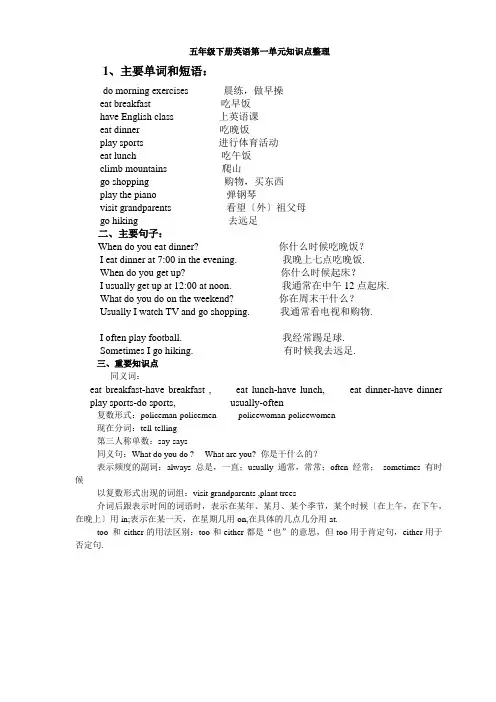
五年级下册英语第一单元知识点整理1、主要单词和短语:do morning exercises 晨练,做早操eat breakfast 吃早饭have English class 上英语课eat dinner 吃晚饭play sports 进行体育活动eat lunch 吃午饭climb mountains 爬山go shopping 购物,买东西play the piano 弹钢琴visit grandparents 看望〔外〕祖父母go hiking 去远足二、主要句子:When do you eat dinner? 你什么时候吃晚饭?I eat dinner at 7:00 in the evening. 我晚上七点吃晚饭.When do you get up? 你什么时候起床?I usually get up at 12:00 at noon. 我通常在中午12点起床.What do you do on the weekend? 你在周末干什么?Usually I watch TV and go shopping. 我通常看电视和购物.I often play football. 我经常踢足球.Sometimes I go hiking. 有时候我去远足.三、重要知识点同义词:eat breakfast-have breakfast , eat lunch-have lunch, eat dinner-have dinner play sports-do sports, usually-often复数形式:policeman-policemen policewoman-policewomen现在分词:tell-telling第三人称单数:say-says同义句:What do you do ? ---What are you? 你是干什么的?表示频度的副词:always 总是,一直;usually 通常,常常;often 经常;sometimes 有时候以复数形式出现的词组:visit grandparents ,plant trees介词后跟表示时间的词语时,表示在某年、某月、某个季节,某个时候〔在上午,在下午,在晚上〕用in;表示在某一天,在星期几用on,在具体的几点几分用at.too 和either的用法区别:too和either都是“也”的意思,但too用于肯定句,either用于否定句.五年级下册英语第二单元知识点整理一、主要单词和短语:season 季节spring 春天summer 夏天fall 秋天winter 冬天swim 游泳fly kites 放风筝skate 滑冰make a snowman 堆雪人plant trees 种树二、主要句子:Which season do you like best? 你最喜欢哪个季节?I like winter best. 我最喜欢冬天.Summer is good, but fall is my favourite season.夏天是很好,但是秋天是我最喜爱的季节.Why do you like summer? 你为什么喜欢夏天?Because I can swim in the lake. 因为我可以在湖里游泳.Why do you like winter? 你为什么喜欢冬天?Because I can sleep a long time. 因为我可以睡很长时间的觉.三、知识点同义词:autumn-fall〔秋天〕三单:say-says ask-asks come-comes对应词:wake up-sleep ;go to bed-get up同义句:What's your favourite season?〔你最喜欢的季节是什么?〕----Which season do you like best?〔你最喜欢哪个季节?〕play with 玩雪,play in the snow在雪中玩, 如果在横线后面有the ,则选择in , 如果在横线后面没有the , 则选择with.like后面不能直接跟动词.如果需要跟动词或动词性词组时,则需在like后面加to. 如果不加to. 就要把后面的动词变成相应的动名词形式.如:I like to swim ===I like swimming.当表示某地某个季节的天气情况时,要把季节放在前面,地点放在后面.其结构为:What's the weather like in 季节in 地点?五年级下册英语第三单元知识点整理一、主要单词:January 〔Jan.〕一月February 〔Feb.〕二月March 〔Mar.〕三月April〔Apr.〕四月May 五月June 六月July 七月August〔Aug.〕八月September〔Sept.〕九月October〔Oct.〕十月November 〔Nov.〕十一月December 〔Dec.〕十二月二、主要句子1. When is your birthday? 你的生日是什么时候--It's in May. 在五月.2. My birthday is in June. Uncle Bill's birthday is in June, too. 我的生日在六月.比尔叔叔的生日也在六月.3. Is her birthday in June? 她的生日在六月吗?--Yes. 是的.4.What's the date? 是几月几日?--June 9th . 六月九日.5. What's the date today? 今天是几月几日?-- It's April 10th. 四月十日.三、主要知识点:1、关于月份:〔1〕五月May , 六月June, 七月July,没有简写形式.九月September 的简写形式是前四个字母加点Sept. 其他八个月的简写形式是前三个字母加点.〔2〕无论是完全形式还是简写形式,表示12个月的单词的第一个字母都要大写.2、关于基数词变序数词.〔1〕一般情况下,直接在基数词后面加th. 〔one , two , three 除外〕.one-first , two-second , three-third .〔2〕以ve结尾的基数词,变ve为f, 再加th. 如:five-fifth , twelve-twelfth.〔3〕以t结尾的基数词,直接加h.如eight-eighth.〔4〕以不发音的字母e结尾的,丢掉不发音的字母e,再加th. 如nine-ninth.〔5〕以y结尾的整十数,在变为序数词时,将y变为ie, 再加th. 如twenty-twentieth .〔6〕20以上的两位数,变为序数词时,十位数不变,只将个位上的数变为序数词.如:twenty-one----twenty-first , twenty-two-twenty-second , thirty-four-thirty-fourth .〔7〕序数词的简写形式为表示该词的阿拉伯数字加上该单词的最后两个字母,最后两个字母要变成上标格式.如:first-1st , second-2nd , third-3rd , fourth-4th . twentieth-20th3. 在回答When is your birthday? 这个问题时,如果只说明生日在几月份,在月份前用in. 如My birthday is in July.如果要具体说明生日是在几月几日,则要把in去掉,直接用is,或者在is后加on.如My birthday is June 9th. 或My birthday is on June 9th .4.注意区分两个句子:What day is it today ? 今天星期几?What's the date today? 今天是几月几日?5. 根据要求写单词:make 〔现在分词〕---making. send〔现在分词〕---sending.6.句子:How many birthdays are in October ? 有几个人的生日在十月?There are 3.7. My birthday is in February . 〔变为一般疑问句〕---Is your birthday in February?8. Does she have a computer? 她有计算机吗?当第三人称单数和句子中出现了does时,其他动词必须使用原型.9、读序数词时,前面一定要加the. 如October 1st .读作October the first.10、同义句:Who has a birthday in October?===Whose birthday is in October?五年级下册英语第四单元知识点整理一、主要单词:draw pictures 画画 drawing pictures 正在画画do the dishes 洗碗碟doing the dishes 正在洗碗碟cook dinner 做饭cooking dinner 正在做饭read a book 读书reading a book 正在读书answer the phone 接电话 answering the phone 正在接电话listen to music 听音乐listening to music 正在听音乐wash clothes 洗衣服washing clothes 正在洗衣clean the room 打扫房间cleaning the room 正在打扫房间write a letter 写信writing a letter 正在写信write an e-mail 写电子邮件 writing an e-mail 正在写电子邮件二、主要句子:1. This is Zhang Peng .〔电话用语〕我是张朋.What are you doing? 你正在干什么?2.I'm doing the dishes. 我正在洗碗碟.I'm reading a book. 我正在读书.3.Grandpa is writing a letter. 爷爷正在写信.Brother is doing homework. 弟弟正在做作业.4.Mom is cooking dinner in the kitchen. 妈妈正在厨房里做饭.5.Dad is writing an e-mail in the study. 爸爸正在书房里写电子邮件.三、知识点:1、在电话中介绍自己时,可以用“It's …”或者‘This is …'.但是不能用“I am …”或者“My name is …”2.在电话中表另一个人接电话时,应该说:“Can I speak to …?”3、告诉别人接电话时,说:There is a call for you.4、在接电话时请别人稍候说:Hold on please.或者Please hold on.5、动词变为现在分词〔加ing〕的规则:〔1〕一般情况下,在动词的后面直接加ing.如:play-playing clean-cleaning draw-drawing cook-cooking 〔2〕以单个不发音的字母e结尾的动词,去掉不发音的字母e,再加ing .如:write-writing come-coming take-taking make-making leave-leaving have-having 〔3〕以重读闭音世结尾的动词,如果词尾只有一个辅音字母,则要先双写这个辅音字母,再加ing.如:run-running swim-swimming put-putting sit-sitting set-setting五年级下册英语第五单元知识点整理一、主要单词:fly 飞flying 正在飞walk 走walking 正在走jump 跳jumping 正在跳run 跑running 正在跑swim 游泳swimming 正在游climb 爬climbing 正在爬fight 打架fighting 正在打架swing 荡秋千swinging 正在荡秋千drink water 喝水drinking water 正在喝水二、主要句子:1. What is it doing? 它正在干什么?It's eating bananas. 它正在吃香蕉.2. What is she doing? 她正在干什么?She is jumping. 她正在跳.3. What are they doing? 它们正在干什么?They are swimming. 它们正在游泳.They are climbing trees. 它们正在爬树.三、主要知识点:1、在英语中,当表示妈妈时,无论是人类妈妈还是动植物的妈妈,都可以用she . 而表示婴儿时,也都可以用it.2、系动词be 的用法:我是am你是are, is跟着他她它.如果人称是复数,扑面一律都用are.如:I am reading a book.He is cooking dinner.We are doing an experiment.Are you eating lunch?3、With 除了表示和…一起外,还可以表示“使用”,如:That elephant is drinking water with its trunk.大象正在用它的象鼻喝水.I am writing with my pen.我正在用我的钢笔写字.4、当句子中出现了can时,动词一定要用原形.如:Can tigers really swim?I can wash the clothes.我会洗衣服.5、can , usually , often , sometimes , always 这几个单词都是一般现在时的好朋友,当句子中出现了它们时,动词一般都要用原形.now, am , is , are 这几个单词都是现在进行时的好朋友,当句子中出现了它们时,动词要用现在分词形式,也就是ing形式.五年级下册英语第六单元知识点整理一、主要单词pick up leaves 采摘树叶picking up leaves 正在采摘树叶catch butterflies 捉蝴蝶catching butterflies 正在捉蝴take pictures 照相taking pictures 正在照相watch insects 观察昆虫watching insects 正在观察昆虫do an experiment 做实验doing an experiment 正在做实验have a picnic 举行野餐having a picnic 正在举行野餐count insects 数昆虫counting insects 正在数昆虫write a report 写报告writing a report 正在写报告collect leaves 收集树叶collecting leaves 正在收集树叶play chess 下棋playing chess 正在下棋二、主要句子1. Are you eating lunch ? 你们正在吃午饭吗?No, we aren't. 不,我们不是.2. Are they eating the honey? 它们正在吃蜂蜜吗?Yes, they are. 是的,它们是.3. Is he playing chess? 他正在下棋吗?Yes, he is. 是的,他是.4. Is she writing a report? 她正在写报告吗No, she isn't. 不,她不是.三、主要知识点:1、现在进行时的句子变一般疑问句时,只要将系动词be〔am is are 〕和主语交换位置,将句末的句号变为问号,但是要注意第一人称和第二人称时,人称和系动词的相应变化.如:I am reading a book? ------Are you reading a book?You're walking . -----Am I waling?He is cooking dinner . -------Is he cooking dinner?2. 表示用什么做个实验时,要用on.如Do an experiment on me , please.3. It's time to 后跟动词的原形,It's time for 后跟名词.如:It's time to go to school. 该去上学了.〔到了去上学的时间了.〕It's time for English class. 到了英语课的时间了. It's time to have English class. 该上英语课了.。
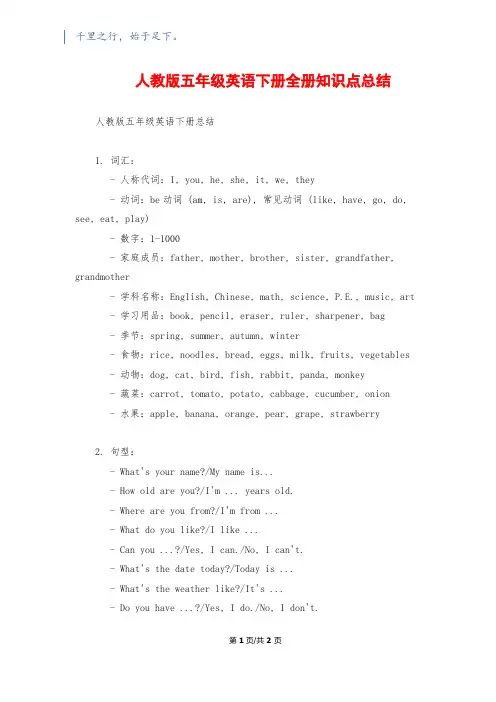
千里之行,始于足下。
人教版五年级英语下册全册知识点总结人教版五年级英语下册总结1. 词汇:- 人称代词:I, you, he, she, it, we, they- 动词:be动词 (am, is, are), 常见动词 (like, have, go, do, see, eat, play)- 数字:1-1000- 家庭成员:father, mother, brother, sister, grandfather, grandmother- 学科名称:English, Chinese, math, science, P.E., music, art - 学习用品:book, pencil, eraser, ruler, sharpener, bag- 季节:spring, summer, autumn, winter- 食物:rice, noodles, bread, eggs, milk, fruits, vegetables - 动物:dog, cat, bird, fish, rabbit, panda, monkey- 蔬菜:carrot, tomato, potato, cabbage, cucumber, onion- 水果:apple, banana, orange, pear, grape, strawberry2. 句型:- What's your name?/My name is...- How old are you?/I'm ... years old.- Where are you from?/I'm from ...- What do you like?/I like ...- Can you ...?/Yes, I can./No, I can't.- What's the date today?/Today is ...- What's the weather like?/It's ...- Do you have ...?/Yes, I do./No, I don't.第1页/共2页锲而不舍,金石可镂。
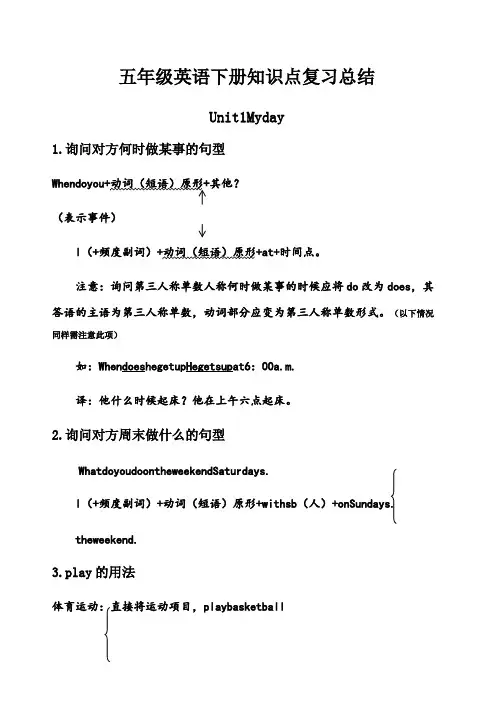
人教版五年级下英语知识点人教版五年级下册英语教材涵盖了多个知识点,包括词汇、语法、句型结构、阅读和写作技巧等。
以下是一些主要的知识点概述:# 词汇学习1. 日常生活词汇:学习与日常生活相关的词汇,如家庭成员、日常活动、食物、衣物等。
2. 学校生活词汇:学习与学校生活相关的词汇,如学科名称、学习用品、学校设施等。
3. 节日和文化词汇:了解不同节日和文化相关的词汇,如春节、圣诞节、感恩节等。
# 语法要点1. 一般现在时:掌握描述日常习惯和事实的一般现在时态。
2. 现在进行时:学习描述正在进行的动作的现在进行时态。
3. 一般过去时:了解描述过去发生的事情的一般过去时态。
4. 比较级和最高级:学习形容词和副词的比较级和最高级形式。
# 句型结构1. 简单句:能够构造和理解由主语、谓语和宾语构成的简单句。
2. 并列句:学习使用并列连词(如and, but, or)连接两个或多个简单句。
3. 复合句:掌握使用从属连词(如because, although, when)连接主句和从句的复合句。
# 阅读技巧1. 理解主旨大意:学会快速浏览文章,抓住文章的主旨大意。
2. 细节理解:通过阅读,能够找到文章中的具体信息和细节。
3. 推理判断:根据文章内容进行逻辑推理,得出结论。
# 写作技巧1. 描述性写作:学习如何描述人、地点、事物等。
2. 叙事性写作:掌握叙述一个事件或经历的写作技巧。
3. 书信写作:学习书信的基本格式和表达方式。
# 听力技巧1. 捕捉关键信息:在听力练习中,学会捕捉对话或短文中的关键信息。
2. 理解语境:通过上下文理解听力材料中的隐含意义。
# 口语表达1. 日常对话:练习日常交流中的基本对话。
2. 角色扮演:通过角色扮演活动,提高语言的实际运用能力。
# 结尾五年级下册英语的学习是一个循序渐进的过程,需要学生在老师和家长的引导下,不断练习和巩固所学知识。
通过多样化的教学活动和实践,学生可以更好地掌握英语语言技能,为未来的学习打下坚实的基础。
人教版五年级下册英语重点内容作为小学五年级学生,英语学习是非常重要的一部分。
本文将总结和介绍人教版五年级下册英语的重点内容,为同学们的学习提供方便和帮助。
一、基础词汇通常情况下,学习任何一门外语都需要一定的基础词汇量。
人教版五年级下册英语也不例外。
以下是一些基础词汇,同学们应该理解和熟练掌握。
•数字 1-100•月份和季节•时间和日常生活中的时钟时间•颜色和形状•对话中常用的简单问和答除了这些基础词汇,同学们还应该掌握如何读音节、单词拼写和基本的语法知识,例如三单形式、常见的连词和代词等。
二、语法知识在学习英语时,掌握语法非常重要。
以下是人教版五年级下册英语重点语法知识。
1. 现在进行时现在进行时(Present Continuous)表示现在正在发生的动作或状态。
这种时态通常由“be”动词和现在分词组成。
例如:“I am reading a book.” (我正在读一本书。
)2. 一般将来时一般将来时(Simple Future)表示将要发生的动作或状态,例如:“I will go to see a movie tomorrow.” (我明天要去看电影。
)在这种时态下,“will”是辅助动词。
3. 形容词比较级和最高级在某些情况下,需要使用比较形式和最高级形式。
比较形式(Comparative)与另一个事物相比较,如“taller”和“smarter”等。
最高级(Superlative)形式表示与所有其他事物相比较,如“tallest”和“smartest”等。
三、听力和口语除了掌握基础词汇和语法知识,听力和口语也是英语学习中的关键因素。
人教版五年级下册英语强调听和说的综合能力。
以下是一些需要注意的内容。
1. 听力在学习英语的过程中,需要大量的听力练习。
听懂英语对于提高口语和阅读水平非常有帮助。
同学们可以选择听英语歌曲、看英语电影或参加英语听力班级练习。
2. 口语在日常生活中,口语是十分重要的。
人教版五年级英语下册全册知识点总结回答方式多样,以下是一些例子:I usually play sports or go shopping on the weekend.(我通常在周末进行体育运动或去购物。
)I XXX(我周六上舞蹈课,周日在家休息。
)It depends。
Sometimes I hang out with friends。
sometimes I do some housework。
and sometimes I just watch TV.(这要看情况。
有时我和朋友出去玩,有时我做些家务,有时我就看电视。
)注意:询问别人周末做什么时,可以使用what或how来引导问句。
回答时,可以使用usually。
sometimes等频度副词来表达经常性或偶尔性的活动。
Unit 1一、重点词汇吃早餐:eat breakfast 上······课:have。
class进行体育运动:play sports做早操:do morning exercises 打扫我的房间:clean my room 去购物:go shopping舞蹈:dancing上午:a.m.通常地:usually二、其他日常活动起床:get up上床睡觉:go to bed活动,运动:exercise吃晚饭:eat XXX散步:go for a walk研究,上(课):XXX上舞蹈课:take a dancing class下午:p.m.吃午饭:eat XXX洗脸:XXX洗我的衣服:XXX看电视:watch TV打乒乓球:play ping-pong弹琵琶:play the pipa去游泳:go swimming去跑步:go running做作业:do homework练武术:do XXX踢足球:play football打篮球:play basketball三、语音cl→ [cl]:clean。
千里之行,始于足下。
人教版小学五年级英语下册知识点归纳五年级下册英语知识点总结一、语法知识1. 一般现在时的用法:表示经常性的动作、常存在的状态、客观事实等。
2. 一般过去时的用法:表示过去某个时间发生的动作或存在的状态。
3. be动词的一般现在时和一般过去时形式的变化。
4. 动词的过去式的构成规则。
5. 用was/were表达一般过去时的第一人称单数的句子。
6. 现在进行时的用法:表示正在进行的动作。
7. 现在进行时的构成规则。
8. 一般将来时的构成及用法:表示将来某个时间要发生的动作。
9. 一般将来时的否定句和疑问句的构成。
10. 用will表达意愿,请求及承诺等。
11. 用is/are going to表达将来的打算和计划等。
二、词汇知识1. 数字的读法和拼写。
2. 时间的表达方法:days of the week, months of the year, dates和钟表时间的表达方式。
3. 表示频度的副词的使用方法,如:always, usually, often, sometimes, seldom, never等。
4. 食物的名称:水果、蔬菜、肉类、饮料等。
5. 家庭成员的称呼,如:father, mother, brother, sister等。
6. 身体部位的名称,如:head, arm, hand, leg, foot等。
7. 学校里的地点的名称,如:office, library, classroom, playground 等。
第1页/共3页锲而不舍,金石可镂。
8. 动物的名称及描述,如:elephant, lion, tiger, monkey等。
9. 学科的名称,如:Chinese, English, math, science等。
10. 物品的名称及描述,如:book, pen, pencil, ruler, eraser, backpack等。
三、句型知识1. 询问与回答个人信息,如姓名、年龄、电话号码等。
人教版英语五年级下册知识点总结一、词汇核心词汇学校生活:classroom, library, playground, office, restroom, schedule, lesson, homework, break, lunch家庭成员:family, father, mother, brother, sister, uncle, aunt, cousin日常活动:get up, go to bed, wash face, brush teeth, eat breakfast, do homework, watch TV, play computer games 食物与饮料:hamburger, hot dog, sandwich, pizza, cake, cookie, milk, juice, water拓展词汇学科名称:math, science, Chinese, English, PE, art, music 颜色与衣物:red, blue, yellow, green, white, black, shirt, pants, shoes, hat, socks动物与植物:cat, dog, fish, bird, rabbit, flower, tree, grass, leaf节假日与活动:birthday, Christmas, Spring Festival, summer vacation, winter vacation, party, picnic二、语法现在进行时表达正在进行的动作或状态。
be动词(am/is/are)+动词-ing形式。
例句:What are you doing? I am reading a book. They are playing football.一般现在时表达经常性的行为或状态。
主语为第三人称单数时,动词形式要发生改变。
例句:She always washes her hands before meals. He often watches TV in the evening.一般过去时表达过去某个时间发生的动作或状态。
五年级下册英语第一单元知识点整理1、主要单词和短语:do morning exercises 晨练,做早操eat breakfast 吃早饭have English class 上英语课eat dinner 吃晚饭play sports 进行体育活动eat lunch 吃午饭climb mountains 爬山go shopping 购物,买东西play the piano 弹钢琴visit grandparents 看望(外)祖父母go hiking 去远足二、主要句子:When do you eat dinner? 你什么时候吃晚饭?I eat dinner at 7:00 in the evening. 我晚上七点吃晚饭。
When do you get up? 你什么时候起床?I usually get up at 12:00 at noon. 我通常在中午12点起床。
What do you do on the weekend? 你在周末干什么?Usually I watch TV and go shopping. 我通常看电视和购物。
Sometimes I visit my grandparents. 有时候我去看望我的外祖父母。
I often play football. 我经常踢足球。
Sometimes I go hiking. 有时候我去远足。
三、重要知识点同义词:eat breakfast-have breakfast , eat lunch-have lunch, eat dinner-have dinner play sports-do sports, usually-often复数形式:policeman-policemen policewoman-policewomen现在分词:tell-telling第三人称单数:say-says同义句:What do you do ? ---What are you? 你是干什么的?表示频度的副词:always 总是,一直;usually 通常,常常;often 经常;sometimes 有时候以复数形式出现的词组:visit grandparents ,plant trees介词后跟表示时间的词语时,表示在某年、某月、某个季节,某个时候(在上午,在下午,在晚上)用in;表示在某一天,在星期几用on,在具体的几点几分用at.too 和either的用法区别:too和either都是“也”的意思,但too用于肯定句,either用于否定句。
五年级下册英语第二单元知识点整理一、主要单词和短语:season 季节spring 春天summer 夏天fall 秋天winter 冬天swim 游泳fly kites 放风筝skate 滑冰make a snowman 堆雪人plant trees 种树二、主要句子:Which season do you like best? 你最喜欢哪个季节?I like winter best. 我最喜欢冬天。
Summer is good, but fall is my favourite season.夏天是很好,但是秋天是我最喜爱的季节。
Why do you like summer? 你为什么喜欢夏天?Because I can swim in the lake. 因为我可以在湖里游泳。
Why do you like winter? 你为什么喜欢冬天?Because I can sleep a long time. 因为我可以睡很长时间的觉。
三、知识点同义词:autumn-fall(秋天)三单:say-says ask-asks come-comes对应词:wake up-sleep ;go to bed-get up同义句:What's your favourite season?(你最喜欢的季节是什么?)----Which season do you like best?(你最喜欢哪个季节?)play with 玩雪,play in the snow在雪中玩, 如果在横线后面有the ,则选择in , 如果在横线后面没有the , 则选择with.like后面不能直接跟动词。
如果需要跟动词或动词性词组时,则需在like后面加to. 如果不加to. 就要把后面的动词变成相应的动名词形式。
如:I like to swim ===I like swimming.当表示某地某个季节的天气情况时,要把季节放在前面,地点放在后面。
其结构为:What's the weather like in 季节in 地点?一、主要单词:January (Jan.)一月February (Feb.)二月March (Mar.)三月April(Apr.)四月May 五月June 六月July 七月August(Aug.)八月September(Sept.)九月October(Oct.)十月November (Nov.)十一月December (Dec.)十二月二、主要句子1. When is your birthday? 你的生日是什么时候--It's in May. 在五月。
2. My birthday is in June. Uncle Bill's birthday is in June, too. 我的生日在六月。
比尔叔叔的生日也在六月。
3. Is her birthday in June? 她的生日在六月吗?--Yes. 是的。
4.What's the date? 是几月几日?--June 9th . 六月九日。
5. What's the date today? 今天是几月几日?-- It's April 10th. 四月十日。
三、主要知识点:1、关于月份:(1)五月May , 六月June, 七月July,没有简写形式。
九月September 的简写形式是前四个字母加点Sept. 其他八个月的简写形式是前三个字母加点。
(2)无论是完全形式还是简写形式,表示12个月的单词的第一个字母都要大写。
2、关于基数词变序数词。
(1)一般情况下,直接在基数词后面加th. (one , two , three 除外)。
one-first , two-second , three-third .(2)以ve结尾的基数词,变ve为f, 再加th. 如:five-fifth , twelve-twelfth.(3)以t结尾的基数词,直接加h.如eight-eighth.(4)以不发音的字母e结尾的,丢掉不发音的字母e,再加th. 如nine-ninth.(5)以y结尾的整十数,在变为序数词时,将y变为ie, 再加th. 如twenty-twentieth .(6)20以上的两位数,变为序数词时,十位数不变,只将个位上的数变为序数词。
如:twenty-one----twenty-first , twenty-two-twenty-second , thirty-four-thirty-fourth .(7)序数词的简写形式为表示该词的阿拉伯数字加上该单词的最后两个字母,最后两个字母要变成上标格式。
如:first-1st , second-2nd , third-3rd , fourth-4th . twentieth-20th3. 在回答When is your birthday? 这个问题时,如果只说明生日在几月份,在月份前用in. 如My birthday is in July.如果要具体说明生日是在几月几日,则要把in去掉,直接用is,或者在is后加on.如My birthday is June 9th. 或My birthday is on June 9th .4.注意区分两个句子:What day is it today ? 今天星期几?What's the date today? 今天是几月几日?5. 根据要求写单词:make (现在分词)---making. send(现在分词)---sending.6.句子:How many birthdays are in October ? 有几个人的生日在十月?There are 3.7. My birthday is in February . (变为一般疑问句)---Is your birthday in February?8. Does she have a computer? 她有计算机吗?当第三人称单数和句子中出现了does时,其他动词必须使用原型。
9、读序数词时,前面一定要加the. 如October 1st .读作October the first.10、同义句:Who has a birthday in October?===Whose birthday is in October?一、主要单词:draw pictures 画画 drawing pictures 正在画画do the dishes 洗碗碟doing the dishes 正在洗碗碟cook dinner 做饭cooking dinner 正在做饭read a book 读书reading a book 正在读书answer the phone 接电话 answering the phone 正在接电话listen to music 听音乐listening to music 正在听音乐wash clothes 洗衣服washing clothes 正在洗衣clean the room 打扫房间cleaning the room 正在打扫房间write a letter 写信writing a letter 正在写信write an e-mail 写电子邮件 writing an e-mail 正在写电子邮件二、主要句子:1. This is Zhang Peng .(电话用语)我是张朋。
What are you doing? 你正在干什么?2.I'm doing the dishes. 我正在洗碗碟。
I'm reading a book. 我正在读书。
3.Grandpa is writing a letter. 爷爷正在写信。
Brother is doing homework. 弟弟正在做作业。
4.Mom is cooking dinner in the kitchen. 妈妈正在厨房里做饭。
5.Dad is writing an e-mail in the study. 爸爸正在书房里写电子邮件。